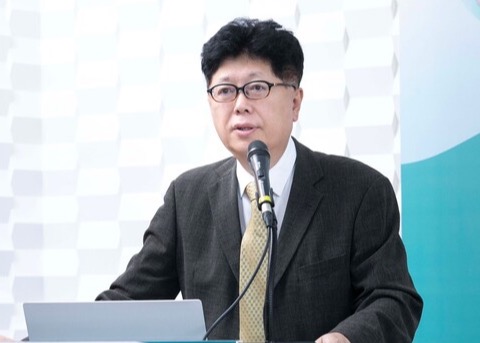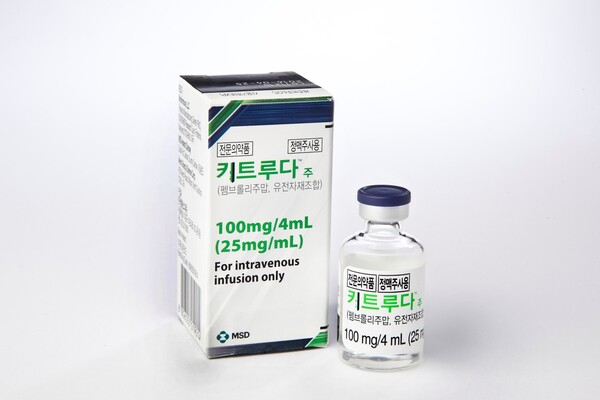Research from the phase 3 KEYNOTE 868/NRG-GY018 study, initially published by MSD and later expanded by independent scientists, reveals varied but promising responses among different patient populations with advanced or recurrent endometrial cancer.
Recent advancements, described by Professor Kim Jae-hoon of obstetrics and gynecology at Gangnam Severance Hospital as “game-changing,” involved combining Keytruda (pembrolizumab) with carboplatin and paclitaxel.
“Keytruda stimulates the immune system, enhancing the cancer’s antigenicity and making it more recognizable to immune cells,” Professor Kim began, at a seminar hosted by MSD Korea on Thursday announcing Keytruda's approval to treat advanced or recurrent endometrial cancer. While Keytruda was approved on Aug. 23 as a first-line treatment for newly diagnosed advanced or recurrent endometrial cancer, broadening patient access regardless of genetic mismatch repair status, Professor Kim emphasized that the high cost remains a significant barrier.
"History suggests it often takes up to two years for newly approved treatments to gain insurance coverage, a timeline that patients and advocates hope will soon change," he said.

Endometrial cancer cases surged by 64 percent in the past four years, reflecting a shift in cancer trends that previously centered on cervical cancer. The lack of preventive measures poses a critical challenge for women's health, with only around 40 percent of financial aid available for uninsured patients.
“For many, the standard chemotherapy regimen of carboplatin and paclitaxel remains the fallback option,” he said.
Traditionally, chemotherapy for endometrial cancer relied on cisplatin and doxorubicin; however, according to Professor Kim, the new standard is the carboplatin-paclitaxel combination. The effectiveness of treatment largely hinges on DNA repair mechanisms: patients with deficient mismatch repair (dMMR) cancer cells are more likely to respond favorably to certain therapies, as their cancer cells struggle to repair DNA damage and are therefore more vulnerable to treatment, while those with proficient mismatch repair (pMMR) can repair their DNA, complicating their treatment.
“Endometrial cancer stands out for its high occurrence of dMMR-related issues, making it a strong candidate for immunotherapy strategies that target these vulnerabilities,” Professor Kim said. He highlighted that Keytruda’s new indication is its third for endometrial cancer and is especially significant as it applies regardless of mismatch repair deficiency status.
“DMMR cancer cells expose neoantigens—unique markers on their surface—making them prime targets for the immune system,” he explained. “As research progresses, the potential for developing more effective treatments for endometrial cancer is becoming clearer, particularly with the promising strategy of combining Keytruda with carboplatin and paclitaxel post-surgery.”
Early studies demonstrated Keytruda's effectiveness as a standalone treatment, particularly for patients with dMMR. In Korea, while reimbursement hasn’t been secured, Keytruda is already approved for use post-surgery or in cases of recurrence. For dMMR patients, Keytruda can be administered alone after initial chemotherapy with carboplatin and paclitaxel. In contrast, pMMR cases may benefit from combining Keytruda with lenvatinib to enhance immune responses. Clinical trials back this combination, demonstrating promise in extending survival for pMMR patients.

The NGY018 trial focused on progressive and recurrent cases, specifically targeting stage 3 or relapsed patients, while evaluating outcomes separately for pMMR and dMMR groups, despite dMMR accounting for only about 20 percent of the overall population. With over 800 participants, the trial compared the effects of Keytruda plus chemotherapy against chemotherapy alone. Preliminary results indicate improved outcomes for both dMMR and pMMR groups, raising critical questions about the underlying mechanisms at play and marking a potential turning point in endometrial cancer treatment.
Notably, patients receiving Keytruda experienced a 46 percent reduction in the risk of disease progression or death compared to those who did not receive the drug. “Combining pembrolizumab with carboplatin and paclitaxel is proving to be a game-changer in treating advanced or recurrent endometrial cancer, showing efficacy in both pMMR and DMMR patients,” Professor Kim said.
Traditionally, pembrolizumab was used post-recurrence in dMMR cases, while pMMR patients received the drug alongside lenvatinib. However, treatment strategies are shifting toward earlier intervention to prevent recurrence by integrating these therapies upfront.
Recent FDA approvals and global endorsements have accelerated this shift, expanding treatment options for patients in Korea. The combination regimen of pembrolizumab with lenvatinib has already been submitted for government insurance coverage, with ongoing efforts to align objectives with the government and ensure timely access for patients, according to Lee Min-hee, Executive Director of the Oncology Business Unit at MSD Korea. “We are actively reviewing the newly approved indication for Keytruda in the same direction,” he said.
Related articles
- [ESMO 2024] MSD remains cautious about when Keytruda’s SC formulation comes to market
- [Reporter's Notebook] The unfulfilled promise of expanding national immunization program
- MSD’s Keytruda OKed as 1st line treatment of advanced endometrial cancer in Korea
- GI Innovation, MSD to evaluate new immunotherapy+Keytruda in resistant cancers in phase 2 study
- 5-fold increase in endometrial cancer in Korea tied to westernized lifestyles, hormonal factors
- Keytruda in triple-negative breast cancer faces accessibility challenges in Korea despite promising survival data
- MSD and CellBion launch Korea’s 1st radioligand-immunotherapy trial for prostate cancer
- Can immuno-oncology revolutionize endometrial cancer treatment in Korea?
- MSD promotes Vaxneuvance ahead of showdown with Pfizer’s Prevnar20 in Korea’s vaccine market
- MSD launches phase 3 Keytruda combo trial in tough-to-treat endometrial cancer in Korea

